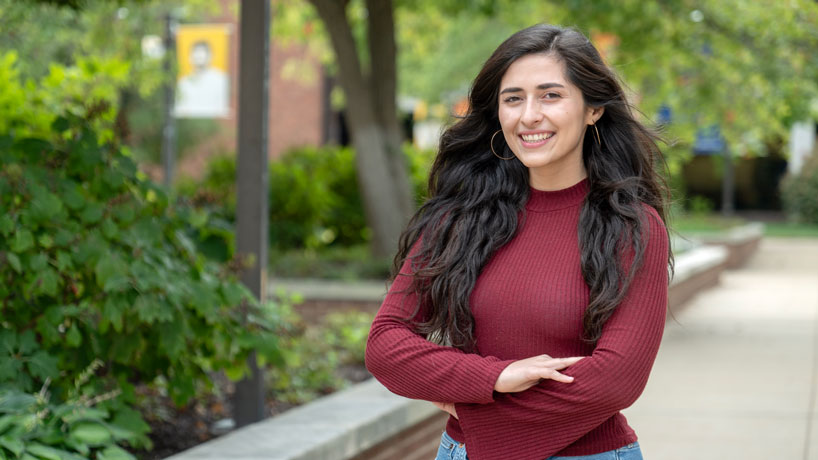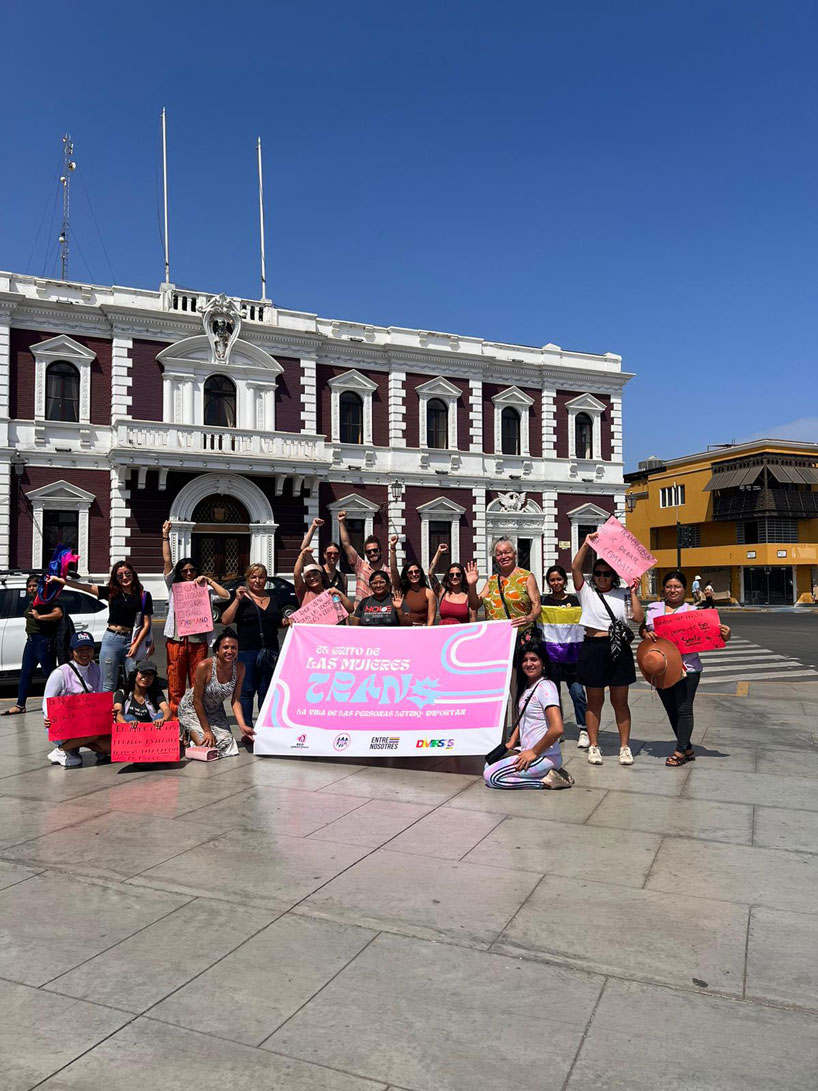
Over the summer, Monica (Mony) Treviño, a student in her fifth year of UMSL’s PhD Clinical Psychology Program, spent six weeks in Huanchaco, Peru, working with PASEO, a global mental health organization dedicated to increasing services for the Latinx population across borders. (Photo by Derik Holtmann)
Growing up in Texas, Monica (Mony) Treviño spoke a lot of Spanish around the house. Her parents are both from Mexico, and she was also born there before her family moved to the U.S. when she was 3 years old.
But while Treviño, a student in her fifth year of the PhD Clinical Psychology Program at the University of Missouri–St. Louis, is comfortable with her conversational Spanish, speaking Spanish with clients in a clinical setting is a different story.
“It’s a very different type of Spanish,” she said. “There’s just so much terminology that we don’t even realize that we’re learning. I’ve been studying psychology for eight years now. That’s eight years of pretty specialized language in English that I had absolutely no exposure to in Spanish. I wouldn’t even know how to speak about very basic therapeutic or assessment items with a client.”
As she approaches the final year of the doctoral program, Treviño is starting to apply to internships, and hopes to land in an area with a large Spanish-speaking population, either back home in Texas or elsewhere in the Southwest. Eager to get more experience speaking Spanish in clinical work, she decided to jump in headfirst.
Over the summer, Treviño spent six weeks in Huanchaco, Peru, working with PASEO, a global mental health organization “dedicated to increasing services for the Latinx population across borders.” The organization’s Linguistic and Cultural Development Program is a six-week immersion and practicum experience designed to help students and professionals in the mental health field strengthen their linguistic and clinical skills to better serve the Latinx community.
“One of PASEO’s missions is to improve the quality of mental health services for Spanish-speaking people in the U.S., and part of that goal is improving training opportunities for Spanish-speaking clinicians in the U.S.,” Treviño said. “Their second mission is to build up infrastructure for mental health services in other Spanish-speaking countries.”
Treviño’s advisor, Associate Professor Emily Gerstein, with whom she works in child development and maternal mental health in the FACT Lab, was immediately supportive of her plans to participate in the program. Gerstein successfully applied for a $3,000 Community Engagement Grant from UMSL’s College of Arts and Sciences to fund Treviño’s experience with the idea that she could take what she learned over the summer to help make the services at Community Psychological Services and the Children’s Advocacy Services of Greater St. Louis more accessible both culturally and linguistically.
Along with a group of 11 other students, Treviño participated in specialized mental health training in Spanish as well as didactic treatment seminars on motivational interviewing and delivering mental health care in low-resource settings. Another key component of the program is service learning through engagement in psychosocial and educational activities out in the community.
Through the program, Treviño and the other students participated in specialized mental health training in Spanish as well as service learning out in the community. (Photo courtesy of Monica Treviño)
For her practicums, Treviño was placed at a local school where she worked directly with high school students. One practicum involved group therapy during study hall periods featuring different activities and in-depth discussions about topics such as gender identity, power dynamics in relationships, families and more, as well as research on the outcomes based on data from questionnaires that the students filled out. The group therapy was rooted in a toolkit from Programa H/M/D, a preventative program designed to promote critical reflection and dialogue about gender equity among young women and men.
“A couple years ago, the program coordinators had gone into the schools and tried to do some research on what the families and faculty there felt was missing or what was necessary or most important for these kids,” Treviño said. “They found that the biggest problems that the students were facing were related to interpersonal violence, interpersonal relationships, conflict management, things like that. Those were the areas that were impacting the kids the most.
“They decided to implement Programa H/M/D, which stands for ‘hombres, mujeres, diversidad,’ so ‘men, women, diversity.’ It challenges ideas of gender stereotypes and improves interpersonal relationship conflict skills and emotion regulation, more generally. It challenges ideas that lead to violence and power imbalances.”
In addition to group therapy, Treviño also offered individual therapy for any of those students who were interested in having one-on-one conversations about stressors in their life. Out of the group of 120 students, she and her colleagues expected that about 20 to 30 would sign up for individual therapy, but ended up getting interest from closer to 50.
“We ended up doing a lot more hours there than we had been expecting, but obviously it was totally worth it,” she said. “It wasn’t typical therapy; it was abbreviated, more like consultations. The first session would be to get an idea of what the problem is and what they already have in their toolbox to support themselves. Then we’d spend the next couple of sessions helping them figure out other ways to manage what they’re going through.”
Treviño also had plenty of time to practice her Spanish, whether in conversation with Peruvian partners in the social work, education or mental health fields, with clients in a clinical setting,eople in the community, such as surf instructors, a local jiu jitsu teacher and the owners of our favorite lunch spots.
“One of my main goals was to feel confident in my ability to do therapy and assessment in Spanish, and I would say that was definitely met,” Treviño said. “In the beginning, it was a bit rudimentary in terms of the clinical skills that we were learning, but it was all in Spanish so it felt very new to all of us. By the end of the program, I felt really comfortable with it and in a good place moving forward in terms of being able to do this more full-time.”
With that in mind, Treviño is working to help make the services at the Children’s Advocacy Services of Greater St. Louis and Community Psychological Services, the latter of which she’s worked at for several years, more accessible to Spanish speakers. Many of the resources used in the PASEO program, for instance, are publicly available and can be immediately implemented in the clinics.
“The Latino population in the St. Louis area has grown by more than 40% in the last 10 years,” Gerstein said. “Our goal is certainly to be able to provide more Spanish-speaking services and more Spanish resources and materials for families in our community than what we do currently.
“Community Psychological Services is not going to be able to start suddenly providing therapy in Spanish, but we do have a lot of kids who get assessments whose families might speak Spanish as their primary language, so we want to look at our intake forms and the tools that we’re providing to these families. Further, even if people can engage in therapy in English, they might be more comfortable reading materials in another language. Their spoken English might be fine, but written English can be a whole different story. So even if we’re providing services in English, how could our other materials be more culturally and linguistically appropriate and accessible?”
As she works to make incremental changes in the offerings for Spanish speakers in the clinics during her final year at UMSL, Treviño is hopeful that other students in the program will continue the effort to improve mental health services for the Spanish-speaking community in St. Louis.
“Being able to have that infrastructure where we already have everything translated and ready to go will make it easier down the line for us to start providing services in Spanish,” Treviño said. “There are a couple of students who are in later cohorts in the program who are also Spanish speakers and maybe have some interest in doing a program like this or getting some more training experiences in Spanish. I am hopeful that we will continue to have new cohorts coming into the program where there will be some experience with Spanish and some interest, and that can kind of just keep growing from here.”















